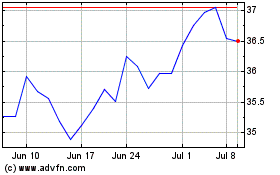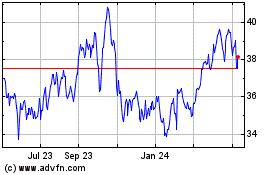Saudi Aramco to Become Holding Company -- 2nd Update
April 25 2016 - 3:17PM
Dow Jones News
By Summer Said and Nicolas Parasie
The Saudi Arabian Oil Co., the world's largest energy firm, is
planning to list less than 5% of its value on stock exchanges in
Riyadh and possibly the U.S., the kingdom's deputy crown prince
said Monday, setting up one of the largest IPOs ever.
By listing even a tiny fraction of the company, known as Saudi
Aramco, the offering would create one of the world's most valuable
businesses. Prince Mohammed bin Salman said Aramco was worth
between $2 trillion and $3 trillion, meaning a 5% listing could
raise $100 billion to $150 billion.
The listing would create a new threshold of public
accountability for a secretive state-run company that currently
doesn't disclose its annual revenues, profits and debts. It could
also bring new scrutiny to Saudi Arabia's proved reserves of crude
oil, which have stood at around 260 billion barrels for years
without significant new finds, even though the company pumps more
than 3 billion barrels of oil or more a year.
"Aramco's listing has many benefits, the most important and
before everything is transparency," the prince said in an interview
with television network Al Arabiya. "It will be under the
supervision of all Saudi banks, all analysts, all Saudi thinkers.
Even more, all international banks and research and planning
centers in the world will monitor it intensively."
The prince outlined plans for Aramco -- much of which had been
previously reported -- as he announced a plan to transform the
kingdom's oil-dependent economy into one more focused on private
enterprise. The Saudis are trying to raise cash during a period of
sharply lower oil prices, and transition to a world that is less
dependent on oil.
It isn't clear how the prince came up with the valuation of $2
trillion to $3 trillion, or whether investors will jump at the
chance to invest in a company that is essentially an arm of the
Saudi government.
But the listing has sparked a frenzy among bankers focusing on
the Middle East, a region where public offerings have become rare
following the drop in oil prices and related stock market
volatility.
The plan was initially met with skepticism by bankers who said
Saudi Arabia was unlikely willing to share with the world some of
its most closely held financial information, But bankers now
regularly travel to Riyadh in the hope to win an advisory mandate
on what could eventually become one of the world's largest IPOs
ever.
Bankers say no adviser has been retained yet for the IPO
specifically but international lenders such as J.P. Morgan have
been active in the kingdom for decades and can fall back on close
ties with the Saudi government and entities such as Aramco.
Consultancy McKinsey is also playing an important role by advising
the Saudi government, these bankers have said.
The prince said the company would be jointly listed in Saudi
Arabia and possibly the U.S. in a process that could take six to
nine months from now. A top Saudi oil adviser, Ibrahim Muhanna,
told The Wall Street Journal last week that New York was the
leading contender for the second listing, with London and Hong Kong
also in contention.
Paul Hodges, a special adviser to ICIS, the petrochemicals
information company, said the culture change awaiting Aramco would
be similar to what Chinese companies went through 15 years ago when
that country prepared to enter the World Trade Organization.
"The process of listing will completely change the character of
the company, and demand a new openness from its senior management,"
Mr. Hodges said.
An unresolved question remains whether a listing will include
the division of Aramco that includes its vast reserves of crude
oil. It manages, but doesn't own, the kingdom's reserves. A number
of Saudi experts and insiders have said Saudi Arabia wouldn't
include its production assets in any listing. Its methods and
reserves tantamount to state secrets.
Robin Mills, nonresident fellow for Energy at the Brookings Doha
Center, said Aramco would have to spell out its loyalties to the
government and the royal family clearly in any IPO. It would also
have to disclose more details about its reserves production and
finances, he said.
"There would also have to be minority shareholder protection and
a fiduciary duty for the board," Mr. Mills said.
The company produces more than 10% of the world's oil supply
every day and controls a large chain of refineries and
petrochemical facilities to complement its exploration and
production operations.
It has already undergone a substantial transformation in recent
years, building out a significant ability to refine its own crude
oil into products like gasoline and diesel. A key goal for the
company is to become the world's largest refiner.
Write to Summer Said at summer.said@wsj.com and Nicolas Parasie
at nicolas.parasie@wsj.com
(END) Dow Jones Newswires
April 25, 2016 15:02 ET (19:02 GMT)
Copyright (c) 2016 Dow Jones & Company, Inc.
BP (NYSE:BP)
Historical Stock Chart
From Aug 2024 to Sep 2024

BP (NYSE:BP)
Historical Stock Chart
From Sep 2023 to Sep 2024
